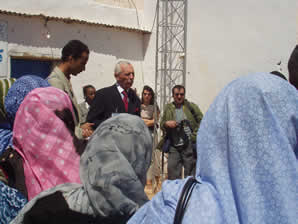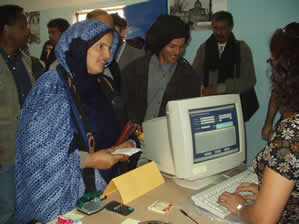UNITED
NATIONS
United Nations Mission for the Referendum in Western Sahara
|
 |
NATIONS
UNIES
Mission
des Nations Unies pour le Référendum au Sahara Occidental |

UNHCR AND MINURSO
INITIATE CONFIDENCE BUILDING MEASURES IN WESTERN SAHARA
SRSG
Swing and UNHCR Rep. Tshitungi Inaugurate UNHCR telephone
service in the Tindouf area on 15 April 2003
|
Throughout 2002, the United Nations Mission for the Referendum
in Western Sahara (MINURSO) assisted its implementing partner, the
United Nations High Commissioner for Refugees (UNHCR), prepare for
the initiation of long-awaited Confidence Building Measures to facilitate
contact between Saharan refugees in southwestern Algeria with their
communities of origin in the Territory of Western Sahara.
The
flat desert terrain stretches as far as the eye can see. Only
an occasional stunted tree, rock outcrop, or mirage, breaks
the monotony. Summer temperatures are among the hottest on earth,
but for 27 years this desolate landscape in southwestern Algeria
has been home to more than 155,000 Saharan refugees, most of
whom have been separated from their families for nearly three
decades.
The refugees, descendants of the ancient Sahrawi tribes, have
been based in four main camps that sprouted in the Tindouf area
(Algeria) in the late 1970s as a product of the war that erupted
between the independence movement POLISARIO and Morocco and
Mauritania over their barren but potentially resource-rich land
from which colonial power Spain pulled out in 1976. In 1979,
Mauri-tania withdrew from the conflict.
Fighting between POLIS-ARIO and Morocco ended in 1991, after
sixteen years, with an UN-negotiated cease-fire that called
for a referendum on Western Sahara to determine whether the
territory would become independent or part of Morocco. But UN
efforts to identify voters have been stymied by disputes over
who is eligible, which has led to 131,038 appeals over the UN
provisional list of 86, 425 potential voters. Attempts to find
a solution to the conflict remain deadlocked, thereby stalling
the identification process and delaying refugee repatriation
indefinitely.
CONFIDENCE BUILDING MEASURES
Confidence building measures (CBMs) were initially identified
early on in the peace process to lay the groundwork of tolerance
for refugee return to Western Sahara.
UN Secretary-General Kofi Annan and Members of the Security
Council have called on the parties, on numerous occasions, to
embark on CBMs to help alleviate the suffering of those separated
from their families for so long.
Following efforts over several years, a new approach was adopted
in 2002, which sought to de-politicize CBMs by focusing on communications
projects which help to bring families together via telephone
and mail services, implemented in incremental steps, leading
ultimately to family visits.
On 15 April 2003, a no cost telephone service was inaugurated
by UNHCR Representative in Algeria Daniel Tchitungi and Special
Representative of the Secretary-General William Lacy Swing,
at a communications center, staffed by UNHCR and MINURSO personnel,
in the first of several camps in the Tindouf are. A mail service
will begin on 15 May 2003. |
|



